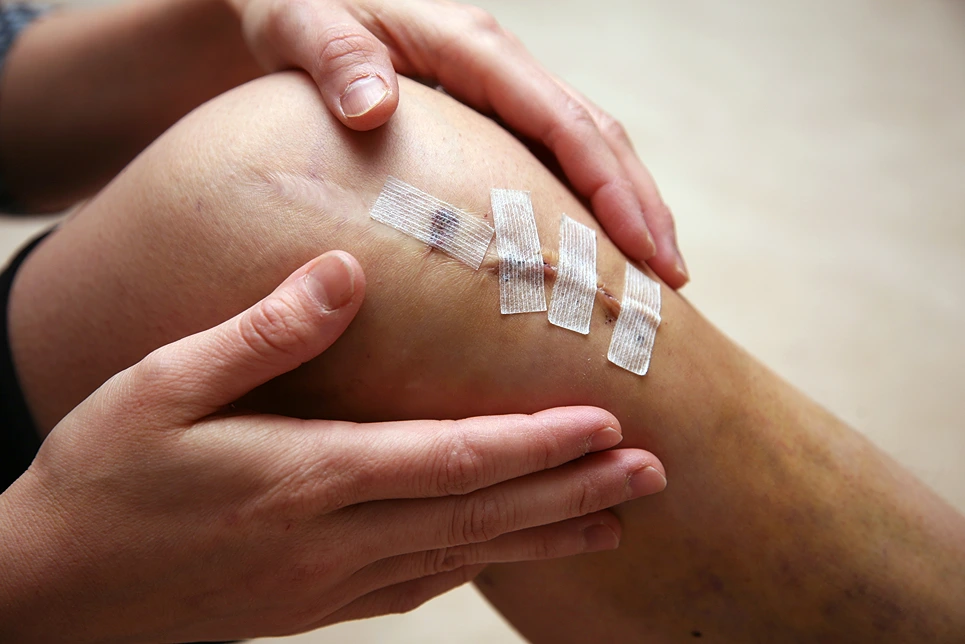

Nerve damage is a serious consideration when undergoing Mohs surgery, a technique used to remove skin cancer.
Damage to the delicate facial nerves may occur during the surgery and can cause symptoms such as numbness, tingling, burning or intense pain in the affected area.
The likelihood of nerve damage depends on various factors, including the location of the operation, size of the cancer and experience of the surgeon. It is important for patients to be aware of this potential complication before having any kind of surgical procedure related to skin cancer.
In this article, we'll discuss key topics you'll need to know about nerve damage in relation to Mohs surgery.
It is possible to get nerve damage after Mohs micrographic surgery, a specialized type of surgery used to treat skin cancer.
There are still some risks associated with this procedure due to the delicate nature of its techniques as it involves removing thin tissue layers from the affected area for microscopic examination.
Nerve damage can occur due to surgical trauma, where tissue around the nerve becomes inflamed or swollen during surgery.
Nerves that may be integral components near certain skin cancers can be harmed during Mohs micrographic removal. Some difficult-to-treat lesions may require multiple stages of surgeries in order to ensure all cancerous cells render harmless and this can further increase risk factors when performing these steps consecutively.
Accidental nicking of surrounding nerves during even single-step Mohs surgeries may occur if not done with utmost care and precision.
In most cases though, the risk of nerve damage is low (4.5% for temporal nerve) - especially with minor operations requiring only one stage.
When patients undergo Mohs surgery, there's always a chance that their nerves become compromised during the process or worse -- damaged beyond repair due to precise cutting away of healthy skin and surrounding tissue.
While nerve damage isn't common with Mohs surgery, it's something that must be taken into consideration prior to any type of surgical treatment.
If undetected or misdiagnosed, complications can occur leading to permanent nerve damage. Also to be considered is chronic pain which may require additional medical attention or measures taken by the patient themselves in order to manage symptoms.
Given the potential severity of complications associated with Mohs surgery, it is essential that patients understand the implications involved before electing for such a course of action.
With guidance from their healthcare professional they should assess all individual risks before making their decision and ensure they feel comfortable with both the procedure itself and potential outcomes in advance.

Numbness after Mohs surgery is a potential side effect many patients experience following skin cancer surgery.
During the procedure, a certified Mohs surgeon will use a surgical knife to remove layers of healthy tissue from around the area where the cancer cells were found.
This involves a careful excision of cancerous cells and facial nerve endings, which can leave your face feeling numb post-op. In some cases, this numbness can last for several weeks while the area heals and recovers its natural sensation levels.
For some individuals, however, the risk of permanent facial nerve damage caused by prolonged surgery or multiple surgeries may increase chances of partial or total numbness in rare instances.
If you’ve been scheduled for Mohs surgery, it is important to discuss possible side effects like anesthesia risks, scarring potentials and any potential issues related to facial nerve damage with your physician well in advance so that adequate preparations are made if required.
After having Mohs surgery, some patients experience a sensation of skin numbness or pain. This is common if the Mohs surgeon removes tissue from areas with a high density of nerves, such as around the lips and nose.
The numbness usually resolves within a few days or weeks but varies due to several factors. Some patients also experience shooting pains or tingling in the area where the numbed area was removed.
However, according to one study, the fraction of patients reporting pain and the severity of that pain diminished steadily thereafter. By day 16% of the patients were experiencing any pain.
Nose numbness following Mohs surgery is a common symptom for patients who have had the procedure to remove cancerous tissue.
The procedure itself can cause nerve injury, which can lead to varying levels of numbness in the area where the surgery took place. A skin graft may also be administered during recovery, which can also contribute to nerve damage and further numbness in the nose.
It’s important for post-surgery patients to understand that this level of temporary numbness is normal; however, if they feel like it’s lasting longer than expected or becoming more intense, it’s wise to consult their doctor right away.
With proper awareness and treatment, most post-Mohs surgery patients find that their nerves heal and the numbing sensation subsides over time.
If needed, reconstructive surgery may be performed immediately after Mohs surgery, to restore normal shape and size to an area where tumors have been removed.
This type of procedure is commonly used for squamous cell carcinoma and basal cell carcinoma, both of which are typically treated with Mohs surgery because these types of skin cancer are likely to return in other areas if not completely eliminated during the initial process.
A skilled surgeon who specializes in reconstructive surgery will make sure that you maintain as much natural feel and motion as possible, while restoring face and body structure to its pre-surgery state.

Nerve damage after Mohs surgery can be problematic and, in some cases, permanent. Fortunately, Dermatology & Skin Health can provide valuable insights into understanding any post-procedure nerve damage. Our team of experienced physicians strive to provide each patient with accurate and detailed answers regarding the procedure and recovery process.
We are committed to providing our patients an exhaustive pre-operative consultation as well as a realistic postoperative prognosis for nerve recovery. With immense knowledge and experience, Dermatology & Skin Health provides the optimal care needed so that each patient understands their condition completely.
If your desired appointment type or preferred provider is unavailable online, kindly call (978) 525-0100 for Peabody, MA and (603) 742-5556 for all New Hampshire locations. Alternatively please feel free to send us your request via the patient portal, or via email at info@dermskinhealth.com
*For medical dermatology appointments in MA please dial (978) 525-0100 or fill out the appointment request form above.